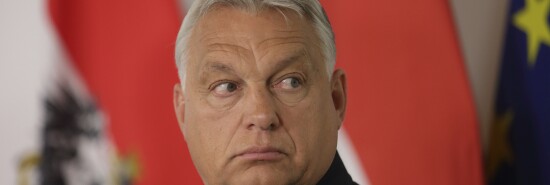
Viktor Orban is not the conservative you are looking for
Zoltan Kesz
Video Embed
In one of his most recent Friday morning radio interviews, Hungarian Prime Minister Viktor Orban claimed that “big food chains and multinational companies are behaving like price speculators; they are raising prices even in circumstances when there is no basis for doing so.”
His government has set price caps on various food products, including chicken breasts, and while that policy is being phased out in exchange for a new regime of government-mandated discounts in grocery stores, one must wonder how Orban became a North Star to so many American conservatives. His price control policies and insinuations that the price of an egg is driven by corporate greed more than market conditions puts Orban closer to American leftists such as Robert Reich, Bernie Sanders, and Elizabeth Warren than the Republican Party where his fandom resides.
JACK SMITH’S DANGEROUS CRIMINALIZATION OF DISSENT
But not even the open socialists of the Democratic Party would follow Orban’s model — because Hungarian anti-inflation policies have been so ineffective that prices are rising more sharply in Hungary than in any other European Union member state.
Such anti-business policies are eerily similar to those advocated by Hungary’s communist-era overlords. In the early 1950s, Hungary’s National Price Office only revised mandated prices three times between 1952 and 1956. It was in 1957 that NPO head Bela Csikos-Nagy reacted to so-called covert price hikes by small businesses that had gained some room to maneuver after the revolution of 1956, warning in an interview with Nepakarat that “if we find during a future analysis that the company gets illegal profits from incorrectly setting prices, we will act not only to take away their profits but to cut prices as well.”
Hungary’s first communist leader, Matyas Rakosi, frequently used the word “speculation” in his economic speeches. In 1947, Rakosi told miners in the city of Pecs that the prices of industrial products were rising while wages and expenses were not. “What rose was speculation and illegal work,” he concluded. In the same year, he promised the Communist Party would engage in a “forceful fight” against “speculation and those driving prices up.”
Any casual observer of American politics would pick up on the link between this rhetoric from communist-era Hungary and America’s contemporary left wing. Prices are framed as conspiracies against the consumer, never a result of government mismanagement of the economy. If not for Orban’s right-wing social agenda, Reps. Ilhan Omar, Alexandria Ocasio-Cortez, and Jamaal Bowman would be proud.
Rather than acting as the “conservative icon” Orban is sometimes claimed to be, the prime minister is appealing to the remnants of communist Hungary by casting himself as the bulwark between everyday Hungarians and corrupt corporations. Orban and his officials speak regularly of so-called extra profits and levying windfall taxes on these apparently ill-gotten gains.
Of course, the Hungarian government does not articulate what it considers to be an acceptable level of profit, much like Sanders in the United States doesn’t have to define the “fair share” he so often demands of America’s wealthy. Orban can claim at any time that a firm is earning too much in profits and tax them away, including those of American companies operating in Hungary. What American investor or company would want to do business in Hungary under that cloud of vindictiveness and uncertainty?
Anti-capitalist narratives rippling across time from the days of the Soviet Union are not something that Republicans should accept. Hungarians shouldn’t either, as the country is ranked 77th out of 180 on Transparency International’s Corruption Perception Index. According to its Global Corruption Barometer, 40% of those surveyed said they believed corruption in Hungary had increased in the last 12 months. Corruption can take many forms, one of which is an arbitrary system such as Hungary’s, where businesses can only succeed when they hold the favor of the government.
The Tucker Carlsons of the world may be enamored with Orban’s ability to articulate a common good with a nationalist spin, but it’s hard to believe the reality of Hungary is what Carlson wants.
The myth of Orban as a conservative icon is just that: a myth. Orban is neither a conservative nor a limited-government advocate but merely another politician in a long sequence of Hungarian leaders who exploit resentment to keep themselves in power. And with power, Orban’s regime can continue to grant billions in state and EU funds to government-friendly oligarchs. It’s understandable that conservatives wish to find a model in the international community by which to explain Trumpism and fit it into the conservative ecosystem of ideas, but Orban is not it — or at least he shouldn’t be.
CLICK HERE TO READ MORE FROM THE WASHINGTON EXAMINER
Zoltan Kesz is the government affairs manager of the Consumer Choice Center and a former member of the Hungarian Parliament.
